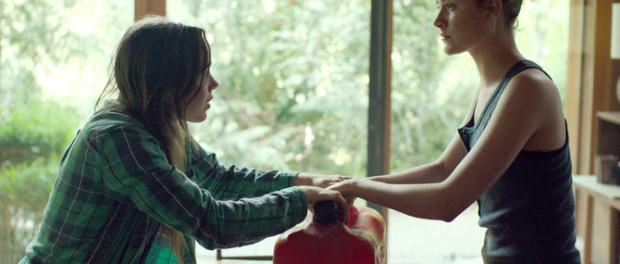Review: Into The Forest
Patricia Rozema is one of the most important Canadian filmmakers, whose work emerged in the late 1980s with I’ve Heard The Mermaids Singing (1987), which won the youth prize at the Cannes Film Festival. She then earned a prominent place in the Toronto New Wave alongside other Canadian filmmakers such as Atom Egoyan, Clement Virgo, and David Cronenberg. Rozema later directed acclaimed films like White Room (1990) and When Night Is Falling (1995).
Earlier this year, Rozema presented her latest film Into The Forest at TIFF. For its 15th edition, Montreal’s Centre Phi projected the ten best Canadian films shown at TIFF and Into The Forest was shown to the public on January 9, with a special Q&A via webcam with director Patricia Rozema.
Into The Forest is based on the novel of the same title written by American writer Jean Hegland. Starring Ellen Page and Evan Rachel Wood, the story is set in a post-apocalyptic world when a power outage hits the West coast. Nell (Page) and Eva (Wood) are left alone to survive after their widowed father (Callum Keith Rennie) is brutally killed by his chainsaw trying to saw wood. The camera becomes our intimate voyeuristic eye into the home of Nell and Eva, where we can watch them closely surrounded by this sinister and threatening forest. Not only does it become a story about survival and social consciousness, it also emphasizes sisterhood and human relationships.

Into The Forest.
As they keep fighting to live in this closed environment and protect themselves, the only two men during this long period of blackout they encounter crudely affect their lives. Eli (Max Minghella) walked from the city to the forest for Nell, who he has known for a short period of time. He asks her to leave her sister Eva so she can come to Boston with him, where apparently there are jobs. Nell agrees to go but comes back in a hurry realizing she cannot leave her sister because they need each other to survive. The other man who comes along is Stan (Michael Eklund) and brutally rapes Eva and then steals their car and gasoline. Eva then becomes pregnant and decides to keep the child.
Filmed in British Columbia but set in Northern California, the forest becomes an important motif representing the circle of life. It holds the death and burial of their father and is where Eva gets raped, but it’s also where the birth of the child takes place. Eva burns down their home and decides to restart life because they are now living in a brand new world and things will have to change. The ending suggests a crucial statement of the new world Eva and Nell are creating from scratch. These are two women raising a child with no men around.

Into The Forest.
Throughout her filmography, Rozema always managed to challenge Canadian cinema and also push boundaries with the stories and characters she decides to represent on screen. In the past, she managed to make one of the very first lesbian romantic films in 1995 with When Night Is Falling. Rozema stated that she has always been drawn to anti-heroes and characters who do not necessarily fit social norms. The dystopian narrative of Into The Forest successfully challenges how society views certain values and Rozema keeps playing with social norms and their boundaries. Ellen Page found the novel and approached the Canadian filmmaker, and went on to produce 60% of the film. Rozema later explained how difficult it is to finance a film with two leading female actresses and hopes to only direct films with women from now on.
Canada’s Top Ten Film Festival is happening right now at Centre Phi until January 17.






